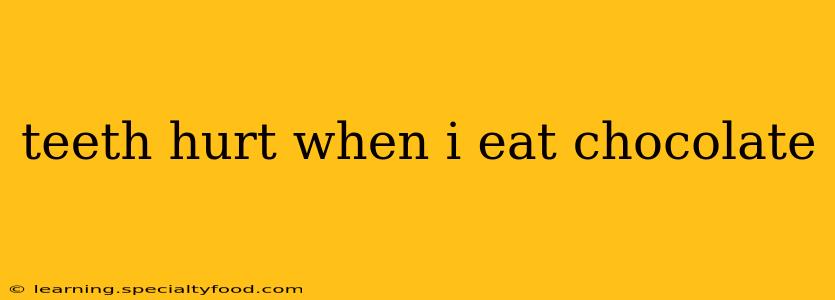Many people enjoy the delightful indulgence of chocolate, but for some, this sweet treat comes with a painful side effect: tooth sensitivity. If your teeth hurt when you eat chocolate, you're not alone. This common problem can stem from various causes, and understanding the underlying issue is crucial for finding effective relief. This comprehensive guide will explore the reasons behind chocolate-induced tooth pain, offer solutions, and guide you towards a healthier, happier smile.
Why Does Chocolate Make My Teeth Hurt?
The sensitivity you experience when eating chocolate is often linked to exposed dentin, the layer beneath the enamel. Chocolate's temperature, acidity, and even its texture can trigger pain in sensitive teeth. Let's delve into the specifics:
Temperature Sensitivity:
- Cold Chocolate: Cold chocolate can cause sharp, shooting pains in teeth with exposed dentin. The cold stimulates the nerves within the dentin, resulting in discomfort.
Acidity:
- Acidic Chocolate: Some chocolates, particularly dark chocolate, are naturally more acidic. This acidity can erode tooth enamel over time, exposing the sensitive dentin and leading to pain when consuming chocolate or other acidic foods.
Sugar Content:
- Sugar and Bacteria: The high sugar content in many chocolates fuels the growth of oral bacteria. These bacteria produce acids that further erode enamel and contribute to sensitivity.
Texture and Physical Stimulation:
- Rough Texture: The texture of some chocolates, especially those with nuts or hard pieces, can physically irritate exposed dentin, leading to discomfort.
What Can I Do If My Teeth Hurt After Eating Chocolate?
Several effective strategies can help alleviate tooth sensitivity caused by chocolate consumption:
1. Reduce Chocolate Consumption:
The most straightforward solution is to limit your intake of chocolate, especially dark chocolate and those with high sugar content.
2. Choose Milk Chocolate Over Dark Chocolate:
Milk chocolate tends to be less acidic than dark chocolate, reducing the risk of enamel erosion and sensitivity.
3. Use a Sensitive Teeth Toothpaste:
Sensitive teeth toothpastes contain ingredients like potassium nitrate that help block the transmission of pain signals from the dentin to the nerves. Consistent use often provides noticeable relief.
4. Improve Your Oral Hygiene:
Maintaining excellent oral hygiene is paramount. This includes brushing twice daily with fluoride toothpaste, flossing regularly, and using an antimicrobial mouthwash to reduce bacteria and acid production.
5. Dental Check-up:
Regular dental checkups and professional cleanings are crucial for detecting and addressing potential dental issues early on, including cavities, gum disease, and enamel erosion. Your dentist can provide personalized advice and treatment based on your individual needs.
Is it Cavities?
How do I know if my chocolate-induced tooth pain is caused by cavities? While sensitivity can be a symptom of cavities, it's not always the case. Cavities often present with more persistent and localized pain, especially when chewing or biting. If your pain is severe, persistent, or accompanied by other symptoms like swelling or bad breath, it's essential to see a dentist immediately.
Can I Still Eat Chocolate if My Teeth Are Sensitive?
Can I still enjoy chocolate if I have sensitive teeth? Moderation is key. Choosing milk chocolate over dark chocolate, consuming it in smaller amounts, and rinsing your mouth with water afterward can minimize the impact on sensitive teeth.
What About Other Foods?
Does this mean I should avoid other foods too? Similar principles apply to other acidic or temperature-sensitive foods and drinks. Limiting your consumption of highly acidic foods and beverages like citrus fruits, soda, and wine can help protect your enamel and reduce sensitivity.
Conclusion: Enjoying Chocolate Without the Pain
Experiencing tooth pain after eating chocolate doesn't mean you have to forgo this beloved treat entirely. By understanding the underlying causes, practicing good oral hygiene, and making mindful choices about the type and quantity of chocolate you consume, you can enjoy chocolate while protecting your smile. Remember, regular dental checkups are essential for maintaining optimal oral health and addressing any concerns promptly.
